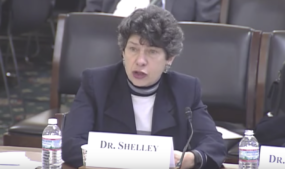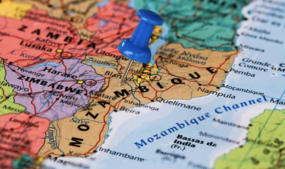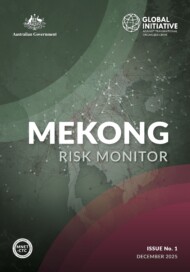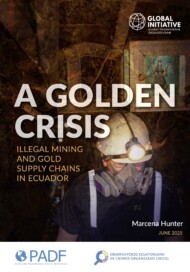Posted on 08 Aug 2018
In East Africa, three spheres co-exist – informal economies, organized-crime networks and terror groups. We need a better understanding of how they may be enmeshed, as well as what separates them.
The economies of East Africa and the Horn are increasingly plugged into the broader global economy, which means that regional illicit activities benefit from this expanding connectivity because informal economies tend to grow in parallel with formal ones. The movement of money and information in the region is also becoming increasingly frictionless. Spreading diasporas, both East Africans going abroad, and non-East African immigrants to the region, mean that these communities are becoming truly global, with networks consequently emerging that can take advantage of contacts, pool expertise and solve problems in ways previously unthinkable.
One of the challenges inherent in identifying and analyzing the linkages between organized crime and terrorism in East Africa and the Horn is that both activities take place in the shadows and in plain view. Al-Shabaab, for example, accesses funds through hidden criminal activities such as money laundering and illegal financial transactions, as well as through overt illicit trade in sugar and charcoal. The organization’s cells plan their attacks covertly but carry them out in public, in the hope of raising its profileand gaining attention.
At the Global Initiative Against Transnational Organized Crime, we regularly speak with people who are directly involved in illicit activities or operate in proximity to them. Yet the ways in which these actors are part of a genuine transnational criminal network, and the linkages between these networks and terrorist groups, are rarely clear. How someone involved in the illicit sale of sugar or charcoal might be linked to a gunman carrying out a terror attack is hard to detect and even harder to prove.
Another challenge here is that while groups and individuals engaged in organized crime often operate in the same types of spaces that terrorist groups occupy, the extent to which this would constitute collaboration is very hard to establish. Illicit markets and informal economies co-exist in many parts of the world, and the fact that terrorist groups operate within illicit spaces does not always indicate a genuine connection, let alone an alliance between organized crime and terrorist groups. Some people who are engaged in illicit activities do not identify themselves as criminals, and even those who do acknowledge their activities as being outside the purview of the law may well not view themselves as part of a transnational criminal network.
Challenges in unravelling the links between criminal economies and terrorism
Furthermore, when it comes to analyzing linkages between transnational organized crime and terrorism, anecdotal evidence is often the order of the day, while concrete evidence is hard to come by. This poses an enormous challenge for analysts and policymakers. How do we take firm steps to develop coherent policies when so much is unclear or even unknown? How do we distinguish between confluence, convergence, collaboration and cooperation when analyzing the nature of the nexus between organized crime and terrorism?
In May the Global Initiative participated in the Global Counterterrorism Forum’s fourth Regional Expert Meeting of the Nexus between Transnational Organized Crime and Terrorism Initiative, held in Nairobi. This forum brought together government representatives, international and national organizations, and policy experts.
I highlighted some of the challenges that researchers and practitioners face in identifying cases in which there may be a connection between organized crime and terrorism in East Africa and the Horn, as well as in crafting effective policies to address them.
As with much of sub-Saharan Africa, many communities in East Africa and the Horn rely on cross-border trade to sustain themselves, often within informal contexts that avoid border controls and state structures. Many of these communities are historically marginalized or have a fraught relationship with the central state or government. This means that policy interventions – whether in the form of a new law that imposes harsh penalties on migrant smuggling, a militarized approach to border control, or attempts to crack down on informal economic activity – may have unforeseen consequences, especially in cases where illicit activities are sometimes enmeshed in the livelihoods of people who are neither transnational criminals nor terrorists.
In this sense, there is a real challenge when deciding how to deal with criminal economies and their possible linkages to terrorist activities. That is, as criminal economies and networks grow, the policies and tools used to combat them need to be nuanced and precise, so as to avoid widespread negative externalities that can have a destabilizing effect on communities, and create new sets of challenges to governance and security.
In the context of East Africa and the Horn, it is imperative that we seek to gain a better understanding of the regional informal and illicit political economies, how they work, who they serve, who benefits from them and who stands to benefit from disrupting them. Traditional law-enforcement approaches might well target criminals, but at the same time they may also disrupt volatile or fragile political, economic, and security ecosystems on which entire communities rely.
Policy and law-enforcement interventions must be based on a clear understanding of the priorities of state and non-state actors, and there must be a willingness to consider that state and law-enforcement mechanisms may not be the best way of addressing problems related to transnational organized crime or terrorism.
When it comes to developing bilateral or regional responses to transnational networks, policymakers must consider how different priorities between states can lead to competing interests and divergent approaches. We delude ourselves if we assume that states in a region as politically and culturally diverse as East Africa and the Horn will be in total agreement on priorities and policies. A good starting point, though, will be to find areas where priorities are convergent and work from there, rather than search for one-size-fits-all solutions that are devoid of local context and ignore political realities.
Photo credit: © Feisal Omar / REUTERS



